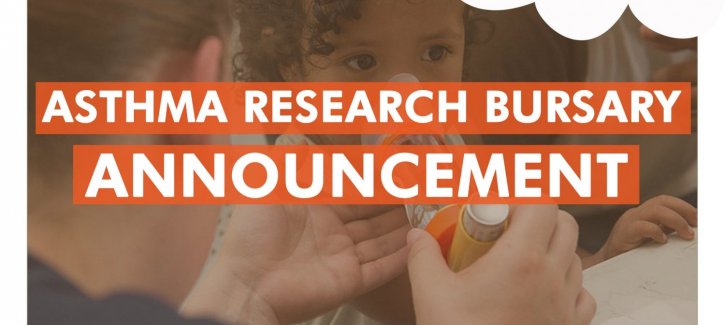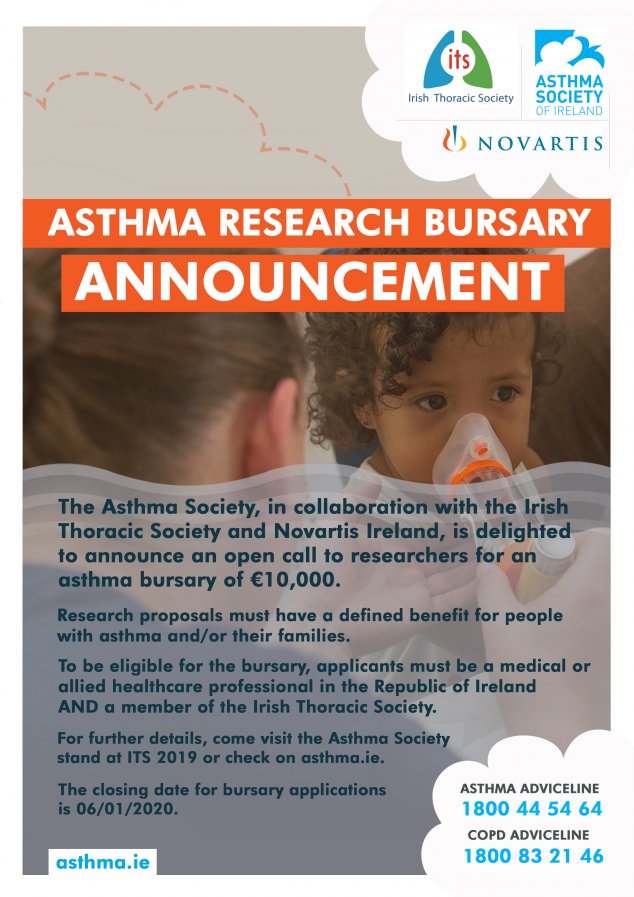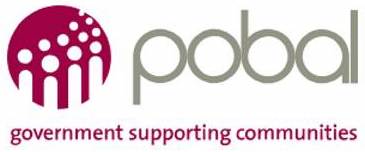
The Asthma Society recently opened a call for applications for the annual Asthma Research Bursary. The bursary, which is a joint collaboration between the Asthma Society of Ireland, the Irish Thoracic Society and Novartis Ireland, aims to improve the lives of people with asthma and their families.
Closing date extended to the 21st of January
The bursary will see the successful applicant(s) granted €10,000 to fund an asthma research project.
The bursary is open to all medical and allied healthcare professionals based in the Republic of Ireland who are also members of the Irish Thoracic Society.
Sarah O’Connor, CEO of the Asthma Society of Ireland, said: “We are delighted to announce this bursary in conjunction with Novartis Ireland and the Irish Thoracic Society. The bursary is an important research initiative aiming to improve the lives of the 380,000 people with asthma in Ireland. One person now dies every six days in Ireland as a result of their asthma. We believe this bursary can be part of the process to help improve the quality of life for people with asthma in Ireland and can create a better understanding of the condition, its treatment and, potentially, its cure.”
Loretto Callaghan, Managing Director, Novartis Ireland said: “Novartis Ireland are proud to sponsor the Joint Research Bursary of the Asthma Society of Ireland and the Irish Thoracic Society. Over the past few years, the bursary has contributed to scientific knowledge in the area, and we are confident this year will be no exception.”
Professor Ross Morgan, President of the Irish Thoracic Society, said: The Irish Thoracic Society supports education and research into respiratory disease and its management on the island of Ireland. We are delighted to jointly open the call for applications for the Asthma Research Bursary at our annual Scientific Meeting in Belfast. We believe that supporting asthma research and, specifically, encouraging early career investigators into work on asthma is vital to advancing the care of people with asthma in Ireland and is a key positive consequence of funding this bursary.”
The research project which will have a defined benefit for people with asthma and/or their families.
Applications close on Tuesday, 21st of January and the successful candidate will be announced in February 2020.
For more information on the research bursary, see asthma.ie or irishthoracicsociety.com
ENDS
About Asthma Society of Ireland
The mission of the Asthma Society is to save and improve the lives of people with asthma. The vision of the Asthma Society is everyone with asthma living a full life, symptom free.
The Society runs a free Adviceline on 1800 44 54 64. Callers can speak to an asthma specialist nurse to get practical advice about managing their or their child’s asthma.
For further information about asthma and the Asthma Society’s services, see www.asthma.ie.
For media queries contact:
Pauric Keegan, Communications Assistant at 086 866 0684 / 01 554 9203 or pauric.keegan@asthmasociety.ie
About the Research Bursary project criteria
Proposals must comprise a research project which will have a defined benefit for people with asthma and/or their families.
To be eligible; applicants must:
- Be a registered medical or allied health professional and a member of the Irish Thoracic Society.
- Be employed in the Irish health services, whether public or private, or alternatively be an academic in an Irish research institution.
- Have support/approval from the employer/department head in which the research is being carried out.
- Conform to the ethical requirements of best research practice.
Selection will be made on the basis of scientific and expert evaluation of the application and the proposed work as set out in the project description.
The scoring criteria are as follows: clarity of hypothesis, innovation, feasibility, candidate eligibility and research track record, wider asthma research and implications for patient quality of life. Independent reviewers will be selected by a Joint Committee of the Asthma Society of Ireland and the Irish Thoracic Society to carry out this task and the final decision will be made by this Committee with the assistance of the reviewers’ assessments. Reviewers’ assessments are strictly confidential and cannot be divulged outside the ASI/ITS, or to the candidates themselves.
Early career researchers are encouraged to apply.
The successful applicant will be required to submit reports at regular intervals throughout the duration of the research and an end-of-project report within a month of the end of the project. This report will be published on the ASI and ITS Websites.
APPLICATION PROCESS
A detailed Project Description is required that does not exceed 1500 words (excluding references). It must contain in sufficient scientific, medical and/or technical detail all of the following points:
a. Introduction
b. Objectives and underlying hypothesis;
c. Material, methods, procedures;
d. Relevance to asthma patients and/or their families;
e. Relationship to your past, current and future professional activities;
f. Reason(s) for choice of host institution;
g. Reference to recent work/publications in the field.
Also enclose:
i) Current Curriculum Vitae, including publications and presentations
ii) One page summary of how you propose to use the funding.
iii) Letter of support from intended supervisor of project (if applicable).
Applications are due by 06-01-2020 and should be submitted by email to: info@irishthoracicsociety.com
About Asthma
Asthma is an inflammatory disease of varying severity that affects the airways – the small tubes that carry the air in and out of the lungs. People with asthma have airways that are extra sensitive to substances (or triggers), which irritate them. Common triggers include cold and flu, cigarette smoke, exercise and allergic responses to pollen, furry or feathery animals or house-dust mites.
People whose asthma is triggered by animal dander may find their allergy is specific to cats, dogs or horses - but other animals such as rabbits, mice, hamsters, guinea pigs and gerbils can also cause their symptoms to escalate.
When the airways come into contact with an asthma trigger, the muscles around the walls of the airways tighten so that the airways become narrower. The lining of the airways swell and produce sticky mucus. As the airways narrow, it becomes difficult for the air to move in and out. That is why people with asthma wheeze and find breathing difficult.
Whilst there is no cure, asthma can be controlled by avoiding triggers and by the use of ‘reliever’ and ‘controller’ medication. Relievers are medicines that people with asthma take immediately when asthma symptoms appear. Controllers help calm the airways and stop them from being so sensitive. Talk to your GP or asthma nurse about which treatment is most suitable for you. All patients with asthma are also advised to have a tailored asthma action plan, a crucial part of patient self-management, which helps patients control their asthma.



